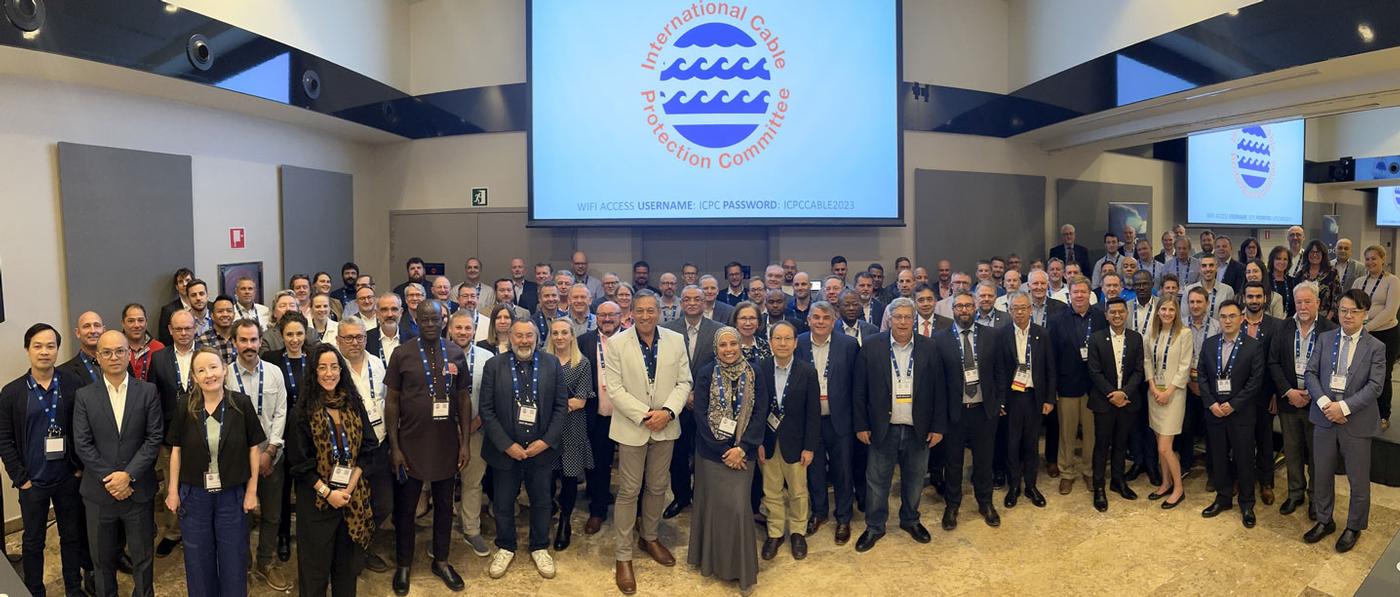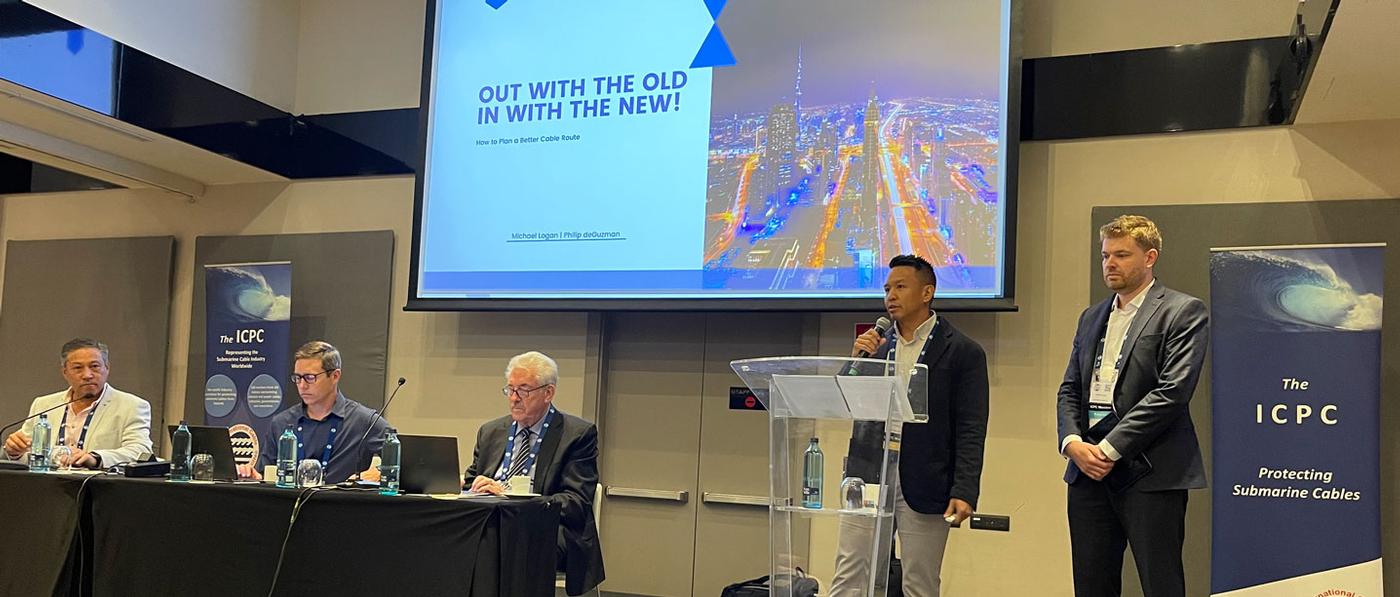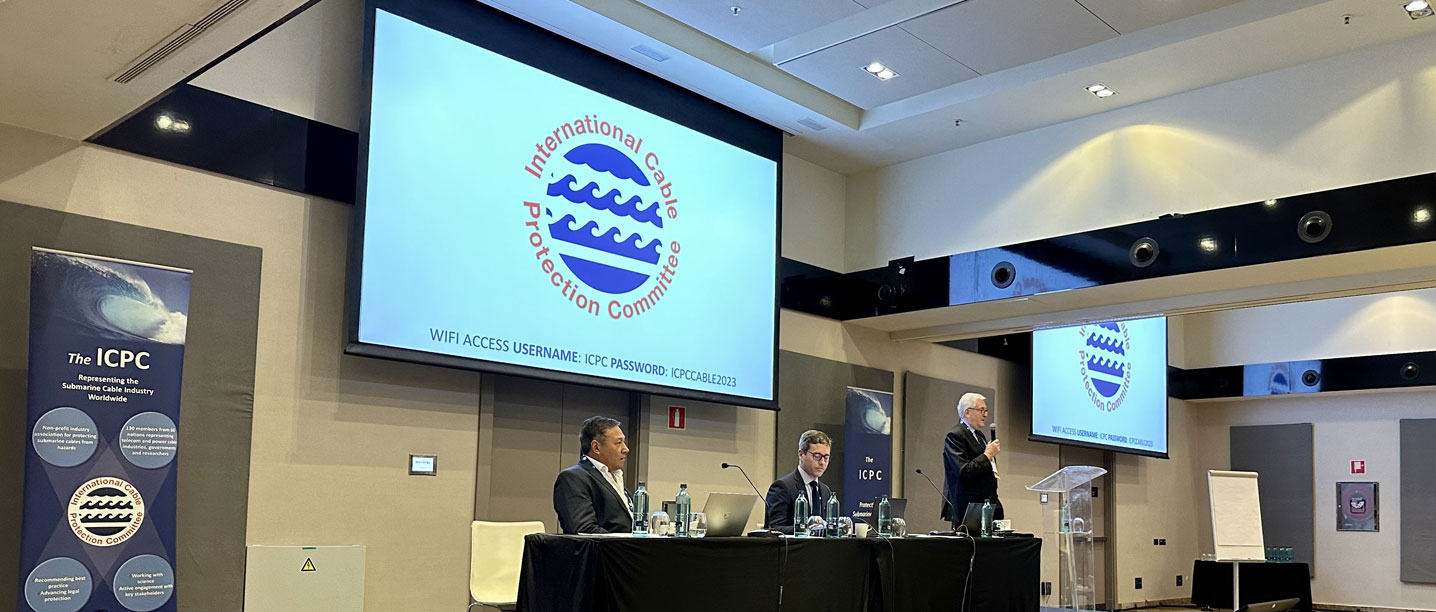
2023 ICPC In-Person Plenary in Madrid, Spain (Day 3)
Once again, a packed agenda took place with key highlights and takeaways provided below. For further details, please download the full presentation when available in the Members area of the ICPC website or reach out directly to the presenters.
Kent Bressie (ICPC International Cable Law Adviser) and Alice Colarossi (ICPC UN Observer Representative) presented an update on the Biodiversity Beyond National Jurisdiction (BBNJ) Treaty, which alters certain provisions and understandings of UNCLOS. ICPC represented the submarine cable industry throughout the negotiations process with the ICPC BBNJ Working Group providing guidance and support. Of particular interest, Kent and Alice explained how treaty negotiations between states work in the background.
Otilia Vermeulen (IKM Ocean Design) presented lessons learned from protection challenges related to 10 projects in Southeast Asia connecting several islands for an accumulated cable length of over 1,000km. Protection requirements such as inshore routing, fishing activity, marine traffic, shipping lanes, free spans, pipeline/cable crossings, on-bottom stability, MPAs, and external/natural hazards was discussed. The general protection philosophy was divided into burial area and surface area, both based in water depths.
Dr. Ron Rapp (SubCom, EC Member) explained the ICPC’s role, mission statement (‘Protect submarine cables from natural and human made hazards’) and vision(‘To be the recognised guardian of subsea cable infrastructure, providing leadership, guidance, and a voice for the industry’) from a business plan perspective. Whether the ICPC should be a ‘policy taker, policy shaper, or policy’ maker was discussed.
Dean Veverka (Southern Cross Cables Limited) discussed marine data gathering from submarine telecom cables used for early detection of human-made threats, ocean/climate monitoring to better understand our environments, and seismology to detect undersea earthquakes (tsunami early warning). The four major environmental mentoring techniques were covered, (1) SMART repeaters, interferometry or Phase Shifted High-Loss Loopback (HLLB), State of Polarisation (SOP), and Distributed Acoustic Sensing (DAS). Alternates technologies to SMART provide less expensive solutions without changing the fundamental design of existing submarine cables. ICPC education via the UN Informal Consultative Process was recommended.
Alice Colarossi (ICPC UN Observer Representative) provided a review of activities and meetings over the past year and how the ICPC is contributing to various discussions to ensure submarine cables are better understood and considered by the United Nations as norms, policies, and treaties evolve. These activities are important to evolve the submarine cable industry from policy taker to policy shaper.
Onni Irish (AECOM) presented two case studies (New York Bight, North Sea) leveraging geospatial science to better understand existing and future macro-scale route constraints to be challenged by major growth in offshore wind development due to US and UK offshore wind auctions in 2022. The sharing of the seabed in harmony with others will be much more challenging, as both these bights are increasingly constrained.
Cai Ferguson (Atkins) summarised the latest ongoing research from UK academic institutions studying nature-based solutions (ex. ECOncrete). By having clear guidance on the scale and ambition of nature-based solutions, demonstrable benefits are possible as evidenced by two use case studies. Given the UK’s protected designations cover 38% of coastal waters, nature-based solutions should be considered, although there’s still work to do around education, risk assessment, and unanswered questions.
Russell Racette (NUWCNewport Division) and Dave Bernstein (Geodynamics Group) presented a new, dynamic approach to perform submarine cable surveys and post-survey analysis that reduced the analysis duration by 50% (about 800 hours of labor), eliminated the need for a follow-up diver survey to ground truth, and provided enhanced results. This enhanced method provides a new, more dynamic approach to support more effective future maintenance, repairs, and removal of submarine cable assets.
Nunzio Randazzo (INFN) presented the KM3NeT-ARCA neutrino telescope, a new generation undersea detector for astrophysics and astronomy studies under construction in the abysses of the Ionian Sea that’s connected via a data and power submarine cable approximately 100km off the Sicilian coast. The array will detect neutrinos, the perfect messenger from space, as they are unabsorbed by matter, electrically neutral, not deviated by magnetic fields, and created only in hadronic processes. This project is a bright example of cross-fertilisation between academic science and industry.
It was great to see so many ICPC Members in person for the first time in several years to discuss the latest developments, insights, and ideas related to protecting submarine cable infrastructure. The exchange of ideas was a daily occurrence aimed at advancing the sharing of the seabed in harmony with others.
It also was announced that the 2024 plenary will be held in Singapore with the exact dates to follow.
In the spirit of Spain, the host countryfor this year’s ICPC Plenary . . .¡Adiós!

2023 ICPC In-Person Plenary in Madrid, Spain (Day 2)
Day 2 of the ICPC plenary was packed with insights, discussions, and presentations with key highlights and takeaways provided below. If any of these summaries pique your interest, download the full presentation when available in the Members area of the ICPC website, or reach out directly to the presenters.
Philip deGuzman (Pioneer Consulting) and Mike Logan (Mertech Marine) kicked off today’s session with an entertaining ‘cupcake’ analogy (base layer, icing, and cherry on top) explaining the challenges and opportunities of deploying new submarine cables. The benefits of increased collaboration between cable installation companies and cable recovery companies were provided, such as fewer crossings for a new system, ability to utilise more of a proven route, reduce cable congestion, and carbon reduction.
Bastian Wichand (Fugro) presented permitting and regulatory best practices, which is often a lengthy, complex, and difficult process when it comes to installing new cables. The process can be expeditedusing a variety of insightful suggestions presented, so if you are involved in cable permitting, contact Bastian, as his knowledge and insights may prove invaluable to your next project.
Andy Newman (Scottish Power Renewables) presented how to achieve better submarine cable crossings, which are increasing prevalent given a progressively congested seabed shared by different entities. After explaining why rock berms are not always the best option, seven key steps were provided and explained to better protect telecom cables, power cables, and pipeline crossings.
Kent Bressie (ICPC International Cable Law Adviser) provided a legal review on a variety of diverse topics including deep sea mining, security, fibre sensing, cabotage, cable damage claims, and several others. It is amazing how many legal areas involve submarine cables, which makesthe ICPC’sinvolvement invaluable.
Tobias Liebetrau (Centre for Military Studies @ the University of Copenhagen) presented challenges and opportunities for states and industry related to submarine cables, which have vaulted to the forefront of discussion and concern globally due to increasingly tense geopolitics and geo economic transformation. Importantly, several considerations were proposed for the cable industry to become a policy shaper and not a policy taker were discussed, which are worthy of investigation given the ICPC’s applicable expertise.
Dr. Francia Gonzàlez Angelotti (Universidad de Cádiz) Although Argentina and Uruguay have regulations related to physical submarine cable damage, the agreed amounts do not incorporatetelecommunications damage. In addition, evidentiary difficulties arise related to civil liability of fishing vessels involved due to a lack of instruments to determine the movement of fishing vessels in the Río de la Plata, which separates the two countries. Presentation conclusion? Improve existing Argentinian and Uruguayan legislation and adopt ICPC good practices to prevent cable and telecommunications damages and avoid legal action.
Liaison updates with other organisations were provided for ESCA (Europe Submarine Cable Association) by Stephen Dawe (Vodafone), NASCA (North American Submarine Cable Association) by Gerald Tourgee (DRG), IHO (International Hydrographic Organisation) and SubOptic 2023 by Graham Evans (ICPC Chair), and West African Cable Protection by Paulo Moura (MainOne). The ICPC motto is ‘sharing the seabed in harmony with others,’ making these liaisons highly relevant to submarine cable protection.
Simon Webster (NEC) and Daishi Masuda (OCC Corporation) co-presented Multi-Core Fibres (MCF) and their effect on submarine cable repair times. Increased industry discussion around MCF to achieve petabit per second cable capacities to address ongoing bandwidth demand makes this a timely discussion. High fibre count SDM (Spatial Division Multiplexing) cables leveraging MCF makes splicing many fibres and cores aboard maintenance vessels challenging and will also require a specialized onboard splicing machine.
Wahab Jumrah (Optic Marine Group) presented recent submarine cable projects passing through marine parks and undersea cultural heritage areas around Malaysia and Thailand. Different interpretations of law results in new permitting requirements by relevant authorities. Multiple case studies, and how to navigate a myriad of relevant Acts, were discussed to facilitate installing submarine cables in these countries. The summary was, if you have no choice but to pass through a Marine Protected Area (MPA), it will take years.
Hiroyuki Kuroda (KDDI) presented how the ongoing proliferation of offshore windfarm turbines, fixed and floating, and seismic observation cables (ex. DONET) present challenges for telecom cables around Japan, an island nation. Conclusion? Sharing the seabed in harmony with others requires cross-industry collaboration and leveraging the recommendations, knowledge, and experience provided by the ICPC.
Dr. Elhad Kassim Said Ahmed (Comoros Cables) presented protection and resilience of the five submarine telecom cablesconnecting the Comoros Islands, located on an archipelago of volcanic origin. These cables face several threats such as strong waves and marine currents, formation of undersea volcanos, rocks of volcanic origin and the Coriolis force, unknown ‘gases,’ and Fishing Aggregating Devices (FAD).
Osamu Harada (PNG DataCo) explained how Papua New Guinea is one the most tectonically complex and seismically active regions in the world exhibiting almost every type of inter-plate tectonic boundaries where most earthquakes and volcanic eruptions occur. Subsequently, careful planning and design was undertaken to ensure all necessary considerations and requirements were met for safe operation, optimal performance of the submarine cable system, and minimising risks due to natural and human-made hazards.

2023 ICPC In-Person Plenary Kicks Off in Madrid, Spain
Graham Evans, ICPC Chair, and Ryan Wopschall, ICPC General Manager, opened the ‘Submarine Cable Resilience – Back to Basics’ Plenary, the first in-person plenary held 3 years and 11 months. Even though the global pandemic left no part of our planet untouched, the ICPC leveraged the virtual domain to grow the full ICPC membership to over 200 members today. The impressive list of 2022/2023 events and meetings held in Australia, Greece, Indonesia, Norway, and other locations to advance the ICPC agenda across a variety of groups and affiliations was summarized.
The ICPC Working Groups (Affiliations, Business Plan, Charting, Fish Aggregation Device, Media & Mining, Public Relations, and Recommendations) provided quick 10-minute updates summarising their accomplishments for the past year. The list of accomplishments is too vast to summarise here so its recommended ICPC Members download the Working Group Plenary presentations offline.
After annual ICPC updates were provided, attendees heard from several presenters in the open session. Below are some presentation highlights that just scratch the surface of what was presented. If you are interested in more details, you may download the presentations in the Members area of the ICPC website in due course.
Dr. Katrin Kohoutek (Walther Schücking Institute for International Law) summarised her research on the freedom and associated limitations to lay telecom submarine cables in the high seas, area, continental shelf, and exclusive economic zone (EEZ). Contradictions, and resultant implications, in UNCLOS (United Nations Convention of the Law of the Sea) related to the continental shelf was discussed alongside a proposal for a global registry of submarine cables and their owners.
Professor Christian Bueger (University of Copenhagen and Safe Seas) talked about how maritime infrastructure protection situation has changed in this new age of security associated with a maritime security agenda, geopolitics and strategies autonomy, hybrid warfare, and ‘grey zone’ tactics. The Nord Stream pipeline sabotage is an example of maritime infrastructure vulnerability and why it is a top priority for NATO and the EU. Detecting and monitoring suspicious activities near maritime infrastructure using satellites, automatic identification system (AIS), and undersea sensors was discussed. Christian’s recommendation is to derive new strategies for how to engage with security politics coupled with a more proactive engagement strategy in the EU and beyond.
Dr. Camino Kavanagh (Department of War Studies @ King’s College London) explained the dynamic process related to the ‘critical infrastructure’ designation. How is this achieved? Via risk analysis, policy, law, regulation, institutional arrangements, monitoring, maintenance, international cooperation, and many other factors. The myriad of challenges with designating submarine cables as critical infrastructure was covered as well as what keeps governments and operators up at night, which has resulted in several observable trends. A global resilience agenda was recommended involving efforts at the domestic, regional, and global levels – a daunting task.
Andy Palmer-Felgate (Edge Networks Services Limited) gave his annual update on cable repair commencement times, which in 2022, witnessed 184 repairs within 48 different coastal jurisdictions with only 2% (5 in total) of repairs having occurred in the high seas beyond the 200-mile limit. External aggression accounts for 87% of all faults with the remainder due to geological events, abrasion, and plant failure. China had the most repairs per annum while Iran had the longest average repair commencement time. Overall, the number of repairs is flat while the number of in-service kilometres has increased. If you are interested in what causes submarine cable faults and where, Andy’s analysis is a treasure-trove of data that concisely summarises the ongoing state of global submarine network repairs.
Dr. Michael Clare (ICPC Marine Environmental Adviser) presented his environmental review, a hot topic of interest, given an increased focus on sustainable submarine networks, as evidenced by a wealth of associated activity at PTC and SubOptic earlier this year. Hot topics over the past year include climate change, electromagnetic fields and thermal effects, interactions with fishing activities, geomagnetic storms and space weather, and extreme natural events (Honga eruption). What is driving this interest and more questions? Growing use of the seafloor and ocean, growing awareness of the importance of oceans, and a growing interest in sustainability in general. Going forward, we must continue evidence-gathering and disseminate science to support decision-making on out-of-service cables, marine spatial planning, and marine protected areas (MPA).
Professor Motohiro Tsuchiya (Keio University) gave an interesting presentation related to global politics and the impact on physical borders between countries past, present, and future. Future conflicts will involve not just countries and borders, but cyberspace as well, which is essentially a fragile patchwork of submarine cables and data centers.As major powers compete for access to data centers and cognitive spaces, increased focus on submarine cable security will intensify.
Dr. Wenlan Yang (International Court of Justice) presented his 2020 Rhodes Academy – ICPC Submarine Cables Writing Award winning paper entitled, ‘Protecting Submarine Cables from Physical Damage Under Investment Law’ that explored gaps in UNCLOS related to submarine cables, which rarely touches upon issues of protection and places limits on jurisdiction of coastal states to enhance protection. Nations lack the political drive to enhance protection so protecting submarine cables from physical damage under Investment Law can be leveraged with inherent challenges discussed using real-world scenarios. Existing tension between UNCLOS and Investment Law, created by nation states, is still to be addressed.
Sophie Ryan discussed her 2022 Rhodes Academy – ICPC Submarine Cables Writing Award winning paper entitled, ‘Submarine Cables and Belligerent Rights in Armed Conflict,’ which is timely, given the current state of heated political tension in regions around the world. Research concluded that little to no specific protection of submarine cables exists today for times of armed conflict meaning more international law efforts are required. Key takeaway is to challenge the assumption that submarine cables are valid targets.
Kent Bressie (ICPC International Cable Law Adviser) presented the Rhodes Academy Awards to Sophie Ryan and Dr. Wenlan Yang on stage for their award-winning papers.
The ICPC would also like to thank Optic Marine Services Group for sponsoring the Welcome Cocktail Reception, as well as the following exhibitors on display at the plenary – ATELDE Atlantic Telecom Depot, Mertech Marine, Subsea Environmental Services, and Ultramap.
This blog summarises highlights of day one of the informative in-person Plenary that encouraged the exchange of information to allow for the sharing of the seabed in harmony with others. There are many different types of organizations present on our planet’s seabed, so ongoing discussions are critical.
Watch this space for the next daily summary of the ICPC plenary being held in Madrid, Spain!